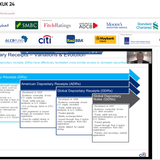The agencies do not judge economic policy choices to define countries’ credit ratings. Instead, they evaluate the results. They raised Brazil’s rating in 2011, when the errors of the Mantega era were already widely noted. Brazil only lost its investment grade rating in 2015, when the disaster caused by Dilma was untenable and undeniable. When the economy is growing, the agencies tend to give the benefit of the doubt, even if they disagree with the policies put in place.
Despite the time lag, these agencies still influence investors, by confirming and reiterating their feeling. So, it is not a good idea to ignore them.
These agencies now recognize the advances made under Temer’s management and agree with the diagnoses and strategy of his economic team. However, they also identify risks in executing these new policies due to the political situation, so they are waiting for evidence of success, namely the return of the growth cycle.
Reclaiming investment grade is another matter. It is necessary to rule out the risk of growth only for a brief interlude, like a chicken’s flight. The agenda for adjustment needs to last longer than just the current presidential term. For this reason, the elections in 2018 are a matter of concern. It is crucial for the next president to continue the fiscal adjustment and make progress on the agenda to eliminate barriers to growth.
Will society choose a president committed to fiscal discipline and a reform agenda, instead of populism?
The space for fiscal irresponsibility has shrunk. If Dilma were given another shot, she probably would not make the same mistakes. The room for populism, of opening the public coffers, has narrowed with the spending cap rule, and with institutions that are finally more attentive. Besides this, the dramatic fiscal situation, exposing the bankrupt state of public services, has perhaps changed attitudes, as indicated by Marcus Melo and Carlos Pereira. An example of this is the commitments to austerity made in the inaugural speeches of many new mayors.
It is crucial for society to understand the benefits of the fiscal adjustment, namely the return of cyclical growth. The decline of inflation and responsible monetary easing by the Central Bank were essential steps. But the reform of the social security system still needs to be accomplished as a condition for a benign picture in 2018.
The second alert is that it is important to remove the privileges of some special interest groups, such as military personnel and the elite civil servants, with their overly generous fringe benefits, and the unjustified tax breaks of some groups.
For society to prize fiscal discipline and repudiate populist appeals, it needs to benefit from the adjustment, through better economic growth and more fairness. The cost of the adjustment must be borne by all.
In the developed world, many members of society are disappointed with capitalism because they see privileged groups capturing the government, as pointed out by Luigi Zingales. This is crony capitalism. As a reaction, people have started to support populist politicians.
Brazil, among other emerging countries, is also beset by a clientelist state, but it is in a different position. We have already experienced a populist government. What appears to prevail here is disaffection with the dream of a mega-state, which made big promises but delivered a disaster.
While on the one hand this can limit fiscal binges in the future, it does not guarantee continuity of the economic adjustment agenda.
Temer and the next leaders need to recapture the trust of the rating agencies, and of society, to reduce the risk of populism and thus move the country toward pro-growth structural reforms. Understanding the anxieties of investors and society are not mutually exclusive objectives; rather, they are complementary.









